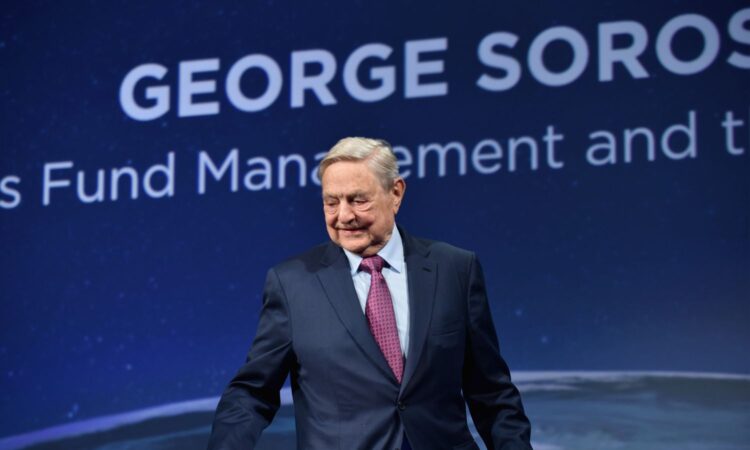
George Soros is one of the most successful and influential investors in history. He is also known for his philanthropic and political activities, as well as his controversial views on various issues. But perhaps his most famous achievement was his role in the 1992 currency crisis that forced the British government to withdraw from the European exchange rate mechanism (ERM) and devalue its currency, the pound sterling.
This event, which occurred on Sept. 16, 1992, is known as Black Wednesday, and it earned Soros the nickname of “the man who broke the Bank of England.”
Key Takeaways
- George Soros is said to have “broken” the Bank of England and precipitated “Black Wednesday” in the U.K. in September 1992 as a result of massive bets he made against the British pound.
- Soros became skeptical of the U.K.’s decision to join the European exchange rate mechanism (ERM), which fixed exchange rates to the German mark.
- Sept. 16, 1992, known as Black Wednesday, was the day speculators forced the British government to pull the pound from the ERM.
- As a consequence, the pound rapidly devalued, leading to an estimated $1 billion profit for Soros and his Quantum Fund.
What Was the ERM?
The European exchange rate mechanism, or ERM, was a monetary system established in 1979 to stabilize the exchange rates of the European currencies and prepare them for the eventual adoption of a common currency, the euro.
The ERM fixed the exchange rates of the participating currencies to the German mark, which was the strongest and most stable currency in Europe at the time. The ERM allowed for some fluctuations within a certain range, but if a currency reached its upper or lower limit, the central bank of that country had to intervene in the market to keep it within the band.
Britain Joins the ERM
Britain initially declined to join the ERM when it was created, preferring to keep its monetary policy independent and flexible. However, in 1990, under the leadership of Prime Minister Margaret Thatcher, the U.K. decided to join the ERM as part of its commitment to the European integration process. Britain hoped that by joining the ERM, it would benefit from lower interest rates, lower inflation, and a stronger currency.
However, Britain’s decision to join the ERM was not without problems. First of all, it joined at a high exchange rate of 2.95 German marks per pound, which made its exports less competitive and hurt its economic growth.
Second, Britain’s economy was relatively weaker and its inflation rate was higher than Germany’s, which meant that it had to keep its interest rates high to maintain its exchange rate.
Third, Britain and the Eurozone faced external shocks from Germany’s reunification in 1990, which increased Germany’s inflation and interest rates and put upward pressure on the mark.
Fourth, Britain faced political uncertainty from the ratification of the Maastricht Treaty in 1992, which aimed to create a monetary union and a single currency in Europe.
Britain entered the ERM with hopes of keeping its currency above DEM 2.70 to GBP 1—but this was practically unfeasible, for the reasons described above. These existing problems were compounded by speculators, who began scrutinizing the ERM and the inclusion of the pound, which resulted in questions about how long fixed exchange rates could fight natural market forces.
To counter this, the Bank of England hiked its interest rates into the teens in an effort to attract more investors to buy the pound. However, speculators such as George Soros began to heavily short the currency, arguing that this monetary intervention was artificial and unsustainable. (A short position involves selling an asset, hoping to buy it back later at a lower price and make a profit.)
The Maastricht Treaty was created as a follow-up to earlier treaties establishing the European communities (EC), which were the EU’s first pillars.
Soros Bets Against the Pound
Soros was critical of the Bank of England’s actions, but he wasn’t alone in betting against the pound. Although he began betting against the pound quietly at first, accumulating around a $1 billion position, he soon became more outspoken.
Indeed, many other speculators and investors saw that Britain’s position in the ERM was unsustainable and that it would eventually have to devalue its currency or leave the system altogether. Soros, however, was the most aggressive and influential speculator. He took a huge short position against the pound.
Soros used his hedge fund, Quantum Fund, to borrow billions of pounds from various banks and sell them for other currencies, such as German marks or U.S. dollars. This created a huge demand for other currencies and a huge supply of pounds, which drove down the value of the pound in the market. Soros also used derivatives, such as options and futures contracts, to amplify his bets and increase his leverage.
Britain Tries to Defend Its Currency
The British government and the Bank of England tried to stabilize their currency by raising their interest rates and buying back pounds from the market. On Sept. 16, 1992, they announced that they would raise their interest rates to 12% from 10%, and then again to 15%, to attract investors to buy pounds and support their exchange rate. They also spent billions of pounds from their foreign exchange reserves to buy back pounds from speculators like Soros.
However, these measures weren’t enough to counteract the massive selling pressure from Soros and other shorts. The market, moreover, did not believe that Britain could sustain such high interest rates for long without damaging its domestic economy. Britain’s foreign exchange reserves were limited and running out fast.
Behind the scene, Germany was also trying to help keep the pound in the ERM. German officials made public statements that realignment within the ERM might be possible in mid-September, Yet, in response to these comments by German officials, Soros decided to increase the size of his bet massively. He moved to a massive $10 billion position from $1.5 billion in the middle of September.
Because of his key role in Black Wednesday, George Soros is known for “breaking the Bank of England.”
Black Wednesday
After hours of frantic intervention and negotiation throughout Sept. 16, 1992, the British government realized that it couldn’t afford to keep buying pounds at the fixed exchange rate. It decided to withdraw from the ERM and let the pound float freely in the market.
As a result, the pound plunged in value by about 15% against the mark and 25% against the dollar. Soros made about $1 billion in profit as a result of his successful bet against the pound.
The withdrawal from the ERM was a humiliating defeat for Britain’s government and a major blow to its credibility and reputation. It also caused economic turmoil and social unrest in Britain, as interest rates remained high, inflation rose, unemployment increased, and public spending was cut. It also damaged the reputation of British Prime Minister John Major and the Conservative Party for ineffective fiscal management.
Why Did George Soros Bet Against the British Pound in 1992?
Soros bet against the pound in 1992 because he believed that Britain’s position in the ERM was unsustainable and that it would eventually have to devalue its currency or leave the system. He used his Quantum Fund to sell billions of pounds and buy other currencies, creating a huge demand for other currencies and a sizable supply of pounds, which lowered the value of the pound in the market.
What Was the Impact of Black Wednesday on George Soros?
George Soros became very wealthy, but also infamous for his role on Black Wednesday. He was praised by some as a genius and a visionary, and criticized by others as a greedy and ruthless speculator who exploited the weaknesses of the system and caused harm to millions of people. He also was accused of having a political agenda behind his actions, as he was a vocal supporter of European integration and a critic of Britain’s reluctance to join the euro.
What Was the Impact of Black Wednesday on the U.K.?
Black Wednesday had a negative impact on the British economy and politics in the short term, but a potentially positive impact in the long term. In the short term, it caused an economic contraction, high unemployment, social unrest, and public spending cuts. It also damaged the credibility and reputation of the Conservative government led by Major, who had succeeded Margaret Thatcher in 1990. The government was widely blamed for mismanaging the economy and failing to protect the pound. It also faced a rebellion from some of its members who opposed further European integration and the Maastricht Treaty. In the long term, however, Black Wednesday allowed Britain to regain its monetary sovereignty and flexibility. It lowered its interest rates and inflation and stimulated its exports and growth, thus boosting the U.K.’s confidence and competitiveness.
What Was the Impact of Black Wednesday on Europe?
Black Wednesday had a significant impact on the European integration process. It exposed the flaws and vulnerabilities of the ERM and raised doubts about the feasibility and desirability of a monetary union and a single currency in Europe. It also increased the skepticism and hostility at the time of some European countries, especially Britain, toward further integration and cooperation in Europe. Nevertheless, the euro did eventually become the single currency for the Eurozone in 1999, and it remains in use today.
The Bottom Line
Black Wednesday was one of the most dramatic and consequential events in the history of the global financial markets. It showed the power and influence of speculators like Soros, who could challenge and defeat governments and central banks with the size of their bets.
It also showed the challenges and risks of maintaining fixed exchange rates in a volatile and interconnected world. It was a turning point for Britain’s economy and politics, as well as for Europe’s integration project.


